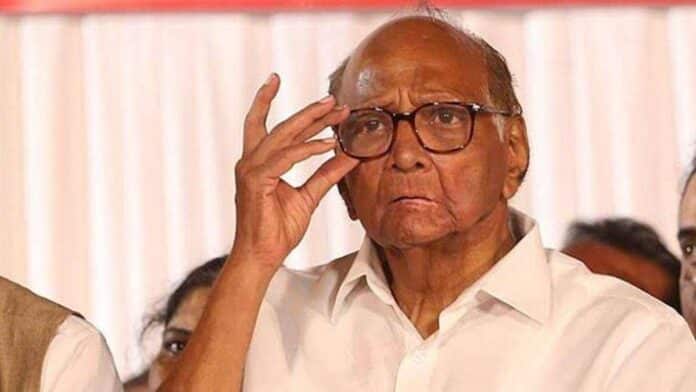The Supreme Court is scheduled to hear on Monday a plea of Sharad Pawar challenging an Election Commission order recognising the Ajit Pawar-led faction as the real Nationalist Congress Party (NCP).
A bench of Justices Surya Kant, Dipankar Datta and KV Viswanathan is likely to hear Sharad Pawar’s plea.
On February 16, the top court had agreed to urgently list the plea after Sharad Pawar stated that a whip may be issued by the faction led by Maharashtra Deputy Chief Minister Ajit Pawar.

The veteran leader had sought an urgent hearing of his plea in the wake of twin blows suffered by the group led by him and the consequential fear of facing action for possible violations of whip by his MLAs.
Sharad Pawar had sought urgent hearing in view of the February 15 order of Maharashtra Assembly Speaker Rahul Narwekar.
Narwekar held that the NCP faction led by Ajit Pawar was the real NCP and that the anti-defection provisions in the Constitution cannot be used to stifle internal dissent.
Prior to this, the poll panel announced on February 6 that the Ajit Pawar faction is the real NCP and also allotted the party’s ‘clock’ symbol to the group.
The special Maharashtra assembly session is beginning on February 20.
Pawar senior, who founded the NCP with former Lok Sabha speaker Purno Sangma and Tariq Anwar in 1999 after their expulsion from the Congress, filed the petition through lawyer Abhishek Jebaraj.
Prior to him, the Ajit Pawar faction had filed a caveat in the Supreme Court through advocate Abhikalp Pratap Singh to ensure that no ex-parte order is passed in favour of the Sharad Pawar group if the latter moves the top court.
Ajit Pawar, currently a deputy chief minister in Maharashtra, had walked away with a majority of NCP MLAs in July last year and supported the BJP-Shiv Sena government led by Eknath Shinde.
“…this commission holds that the faction led by the petitioner, Sh Ajit Anantrao Pawar, is the Nationalist Congress Party (NCP) and is entitled to use its name and reserved symbol “clock” for the purposes of the Election Symbols (Reservation and Allotment) Order, 1968,” the EC had said in its 140-page order.
The commission had said there were serious inconsistencies in terms of timelines in the claim of the Sharad Pawar group on organisational majority, which resulted in unreliability of their claim.
It had also expressed the hope that political parties will adopt good disclosure practices of organisational elections and internal party democracy.
Then came the decision of the assembly speaker on February 15, the deadline fixed by the top court for deciding disqualification plea.
The speaker, in his elaborate decision, dismissed the disqualification petitions filed by the factions led by Ajit Pawar and his uncle Sharad Pawar against each other’s legislators.
The Speaker noted that the Ajit Pawar group had “overwhelming legislative majority” of 41 out of 53 party MLAs when it decided to join the Shiv Sena-BJP government in Maharashtra in July 2023.
Also Read
The Ajit Pawar group was, thus, the “real political party” when the factions emerged, Narwekar said.
“All the petitions seeking disqualification of MLAs are rejected,” Narwekar had said while reading out the ruling at the legislature complex in Mumbai on February 15.
Questioning then party supremo Sharad Pawar’s decisions or defying his wishes did not amount to defection but it was only internal dissent, the speaker had said.
The tenth schedule of the Constitution, which provides for disqualification of a legislator in case of defection, was misused in this case, Narwekar had held.
A party leadership cannot use the tenth schedule to stifle dissent of a large number of members by threatening to disqualify them, he had said.







